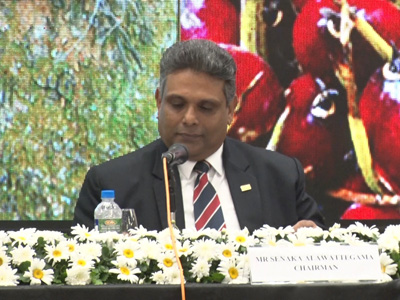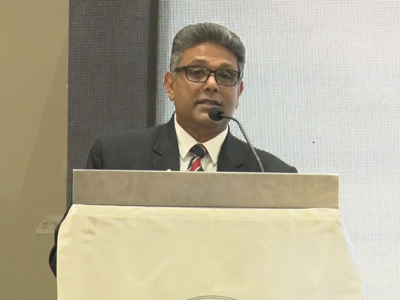PA AGM 2022 Speech by Mr. Senaka Alawattegama - Chairman
Good evening Ladies and Gentlemen,
-
Chief Guest Hon. Dr Ramesh Pathirana, Minister of Industries and Plantation Industries
-
Guest of Honour, Mr Niraj De Mel, Chairman SLTB
-
Chairman pro tem Dr Roshan Rajadurai
-
Outgoing PA Chairman, Mr. Bhathiya Bulumulla
-
Secretary General Mr. Lalith Obeyesekere
-
Chairman, Hayleys PLC, Mr Mohan Pandithage
-
My colleagues from the Plantation Companies
-
And to all stakeholders of the Plantation Industry
 Let me start by thanking Dr. Rajadurai for his kind words. Let me start by thanking Dr. Rajadurai for his kind words.
I also take this opportunity to thank the membership of the Planters’ Association of Ceylon for placing their trust and confidence in me in electing me to serve as Chairman of the Planters Association of Ceylon for the financial year 2022/23.
It is truly an honour and a privilege for me to take up this appointment at the helm of our industry and our nation’s oldest and most prestigious association, and help champion the interests of an industry that has served as a lynch-pin of the Sri Lankan economy for generations.
Let me also thank my Company – Hayleys Plantations and Talawakelle Tea Estates PLC - and our Chairman, Mr. Mohan Pandithage, and my Managing Director, Dr. Roshan Rajadurai, for encouraging me to take up this prestigious position, in addition to continuing with my ongoing responsibilities as Chief Executive Officer at Talawakele Tea Estates PLC.
The past two years in particular have challenged our industry like no other era in our nation’s history. Hence on behalf of our entire industry, I wish to also take this opportunity to offer my heartfelt gratitude and congratulations to our outgoing Chairman, Mr. Bhathiya Bulumulla, for helping to successfully steer our entire industry through the near simultaneous shocks of a COVID crisis, a devastating overnight fertilizer and agro-chemical ban, and the subsequent disruptions caused by Sri Lanka’s historic economic downturn.
During his tenure, our industry was also compelled for the first time since 1992 to enter into litigation as a result of the ill-advised decision on the part of Trade Unions to abandon the terms of the Collective Bargaining Agreement by involving the Wages Board.
While all RPCs have continued to pay the flat Rs. 1,000 daily wage demanded by Trade Unions, our nation’s historic economic crisis has only served to vindicate the position that has long been maintained by the Planters’ Association of Ceylon in the face of vicious and sometimes even violent opposition, namely: that wage reform towards a productivity linked wage model is the only practical way forward.
We note with deep concern how during the last round of wage negotiations, Mr. Bulumulla was often required to give leadership to our collective efforts to prevent breakdown of law and order on the estates. In several instances, our fellow planters were forced to put their life and limb at risk as a result of mob violence incited by politically connected individuals. Sadly, in recent years, good-faith negotiation has increasingly given way to similar kinds of thuggery.
While the honourable Minister of Plantation Industries has always served as a source of strength in such difficult moments, especially with fresh negotiations looming, we wish to take this opportunity to urge the Honourable Minister to take all possible steps to ensure that law and order prevails on the estates moving forward.
At a time when our nation is in desperate need of foreign currency earnings, it is more important than ever that we export as much of what we produce as possible. This in turn requires smooth functioning of all operations from field, to factory and auctions. Over the coming year, we urge all stakeholders to keep this fact in mind.
Labour shortage, wage reform
Looking to the future, our biggest challenges may well be ahead of us. Chief among them is the shortage of labour across the plantation sector. For the RPC sector, our workforce has reduced from 327,000 in 1992 down to approximately 115,000 to date, and shows no signs of stopping. Especially if Sri Lanka is to achieve its national production targets our first priority is to implement every viable measure to reverse the migration of labour out of the plantation sector.
The only way to accomplish this is to introduce a model of work that actually serves the interests of our employees. The same flat daily wage system which has been in place since the colonial era is simply not suited to the task. As our Association has stated time and again, a productivity-linked wage is the only way forward.
With it, we can pay workers substantially more than the flat daily Rs. 1,000 they currently earn, and even more than the new flat daily wage rates that are now starting to be demanded. While this position has been roundly ignored in the past, we believe that the importance of systemic reform is finally beginning to permeate into the public sphere and we remain optimistic that such reforms can finally be realized in the near future.
The success of the tea smallholder sector - in terms of increasing the earnings of workers and increasing productivity proves that this model is effective. The experiences of RPCs that have now reliably shown that worker earnings increase drastically when wages are linked to productivity.
Even the Trade Unions admit that productivity-linked wages are the solution to raising worker wages sustainably. There is no rational reason to oppose these reforms. We therefore urge all stakeholders to first come to an agreement on this fundamental fact, so that we can all move forward in a manner that benefits our employees without compromising the financial viability of the enterprises they depend on for their livelihoods.
Agri-chemical reversal
We also wish to strongly commend Mr Bulumulla and the PA Secretariat for their tireless, and often thankless efforts in holding the line on the tragically misguided agri-chemical ban. While the ban was eventually reversed during his tenure, sadly the effects of these lop-sided policies will continue for years to come.
Notably, despite RPCs being among the most vocal about the many failures stemming from the 100% organic agriculture policy, when the time came, that these policies were rightfully reversed, and fertilizer was to be released to the agriculture sector, RPCs were not prioritized.
This despite our sector being willing to pay market rates, without any subsidy assistance from the Government – unlike what has been offered to most others engaged in agriculture. Moving forward, we will continue to demand that our sector be given its fair share – nothing more or less. We reiterate that the plantation sector should not be punished for the ill-conceived policies which we had no hand in implementing.
Another key priority for our association over the coming year will be to continue taking all possible measures to secure the additional agri-chemicals required by the plantation industry, including the rubber sector, in order for it to more effectively combat the continuing outbreak of Pesta Leaf Fall disease, in addition to controlling weeds and pests in a sustainable and responsible manner.
 Crisis as an opportunity for innovation Crisis as an opportunity for innovation
The multiple crises we have faced over the past two years have been incredibly challenging, but we believe that within these challenges lie the seeds of unprecedented new opportunities. Already we have seen remarkable changes take place in our industry, Following the COVID pandemic, we saw the 150 year old outcry system at the tea auctions into an online system. This was an enhancement which had stagnated in discussions for many years without any real signs of progress. But when the time came, these seemingly insurmountable challenges were solved almost overnight.
Technology is another pathway to unlock new potentials in our industry. Already RPCs have been experimenting with precision agriculture, in order to optimize plant nutrition and effective utilisation of agro-chemicals. Meanwhile, real-time information sharing and virtual conferencing is enabling greater responsiveness in management functions, and creating powerful opportunities for training and knowledge sharing within the industry. Such innovations can serve to create fresh perspectives to long-standing problems.
Crop diversification and oil palm
As Mr. Bulumulla effectively highlighted, crop diversification is another area in which political interference has for far too long been allowed to obstruct real economic development. During my tenure, I plan to strongly advocate for all stakeholders to completely honour the spirit and letter of the agreements on which our membership first undertook the privatized management of the plantation sector.
These covenants explicitly provided companies with absolute discretion in developing and executing land use policies for each RPC in a manner that sustainably generates the most value for each company. That includes the freedom to diversify into any business model or crop that creates sustainable national economic value.
Part of this responsibility is of course vested with the RPCs themselves. And I urge all of our members to continuously re-evaluate their land use policies in order to ensure that they are making maximum use of all of the land allocated to them. In instances where the land has become unsuitable for crops like tea or rubber, we should certainly be looking to instead produce other valuable crops like coffee and spices.
However, it is also the responsibility of all other stakeholders, and especially of the Government itself to ensure that RPCs are encouraged to diversify as they see fit. During my tenure, I aim to take all possible measures to enable RPCs to unleash their full potential, and this will include supporting efforts to continue and sustainably expand oil palm cultivation.
Especially at a time when Sri Lanka’s foreign currency reserves have been completely depleted, the economic benefits of this crop cannot be overstated. At present Sri Lanka produces approximately 29,000 MT of oil palm per annum. This is only about 8 – 10 percent of our countries edible oil requirement for domestic usage. The value of those imports is now US$ 150 Million.
Policy makers, and all those opposed to oil palm cultivation in Sri Lanka need to ask themselves whether it is better to spend what precious few dollars we have to pay nations that do not respect environmental standards to send us their palm oil to manage our domestic consumption, or whether it would be more cost-effective, ethical, and financially rewarding, to simply conserve our foreign currency, and instead produce oil palm sustainably in Sri Lanka.
To us the answer seems obvious, while the objections to oil palm cultivation have long been proven to be completely lacking in scientific fact. It is therefore clear beyond a doubt that our nation literally cannot afford to continue using emotional arguments to dictate economic policy as it has done in the past with oil palm. We hope that at least this time, policy makers have taken these lessons to heart.
Moving forward, effective land utilisation must be the core factor determining the success of an RPC. There are already numerous examples of RPCs engaged in innovative crop diversifications and value addition, renewable energy and eco-tourism, as well as those who are investing significantly in mechanisation of harvesting, and other innovative agronomic strategies that need to now be studied, and emulated across the entire plantation sector and not just the RPC sector.
In this manner, I believe that we can chart a more sustainable and prosperous future for our industry, and all those connected to it. I invite each of you to lend your support to these efforts over the coming year.
I am confident that the membership shall give their fullest co-operation to me during my tenure as the Chairman to take forward the Planters Association of Ceylon to new heights, whilst addressing the core issues in a manner that is responsible, forward-thinking and capable of creating a sustainable future for all industry stakeholders.
Released in Sept 2022
|